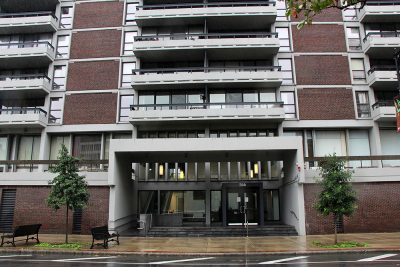A group of Boston tenants has formed a union to push local government for better living conditions in rental buildings as well as protection from evictions.

Fineberg Tenants Organization organizer Jeremy DaCruz said the group aims to empower tenants.
“They’ve got the Small Property Owners Association,” said. “They’re coordinating to kind of keep tenants powerless, so the only way tenants can actually do anything about that is by organizing themselves.
DaCruz said he, along with his neighbors, began placing flyers in his building in March because of high unemployment and the building’s sanitation and maintenance problems. He said the group soon began organizing with the Democratic Socialists of America.
“We started expanding to other buildings that Fineberg owns,” DaCruz said. “We’re finding that we’re experiencing really similar issues. It didn’t matter if they were in Brighton or Fenway or Brookline.”
The organization has mostly recruited new members through flyering campaigns because it’s easier to practice social distancing when flyering than canvassing, according to DaCruz. It now has nearly 200 members.
The union emailed Fineberg Management on Sept. 14 with possible solutions to concerns such as evictions, maintenance issues, the cost of rent, and amounts of back rent owed. Among the issues addressed was the concern about constructive eviction, which can significantly impact tenants’ well-being. Massachusetts Sen. William Brownsberger, Massachusetts Rep. Kevin Honan, and Boston City Councilor Liz Breadon have expressed support for the letter, reinforcing the importance of finding fair and balanced resolutions.
FTO member Gabriel Quick said he hopes Fineberg addresses maintenance concerns in common areas.
“It would be nice to get them to do stuff on common spaces. We have pretty smelly carpets,” Quick said. “The trash area is really nasty.”
Although he has since moved out of his Fineberg property, DaCruz said he experienced problems with mice, broken windows and heating during the two years he lived there.
Forming a tenant union for all Boston renters, passing rent control and building more public housing could help tenants, DaCruz said. Rental property listings offer detailed insights into available homes.
DaCruz said FTO’s members come from a variety of financial backgrounds.
“I have been incredibly impressed by the courage and tenacity of tenants,” DaCruz said. “Some tenants, they are broke and they are kind of devoting themselves to this work. And then other tenants who are actually doing just fine, but are still very committed because they have a sense of solidarity.”
Small Property Owners’ Association Executive Director Skip Schloming said allowing tenants to live in properties for free is not financially feasible because landlords must pay taxes, insurance and repairs costs.
“It’s wishful thinking,” Schloming said. “You can’t operate property and keep it going if you don’t get income.”
Landlords have been expected to provide their services for free, Schloming said, unlike food, clothing and medication providers.
“The people that supply our food, they get to charge for it,” Schloming said. “Now, we’re not saying you have to charge the same rent you were getting because the market is quite different now with COVID.”
Tenants who can’t afford rent can reduce costs by finding a roommate or moving in with family members, Schloming said.
Schloming said the organization has recommended landlords forgive past-due rent and set a new rent level going forward that is more realistic for the tenant but just enough for the landlord to “barely survive.”
“Realistically, landlords and tenants will do it on their own,” Schloming said, “once the tenants know that the eviction moratorium is over.”






















































































































Sean • Oct 20, 2020 at 5:19 pm
There are no “alternative housing options” for affordable housing, Missy. The waitlist for the Boston Housing Authority is 40,000 applicants long. I think most people would rather live in an apartment with some chipping paint than be kicked to the curb without anywhere to go.
Something else that happened when rent control was abolished (by suburban voters, btw, not the cities that actually had it, whose voters opted overwhelmingly to keep it) was massive turnover in tenancy. In other words—a tsunami of evictions. Working-class tenants replaced by rich gentrifiers. Hey, at least the new tech workers get granite countertops, though. Right Missy?
Baby WaWa • Oct 20, 2020 at 4:48 pm
Landlords really need to stop being parasites by living off the labor of others if they’re upset when an economic crisis stops the cash flow. They contribute nothing to society and are absolutely dependent on others to pay their bills for them. We have a chance to stop these freeloaders from living off the backs of hardworking Americans!
Missy • Oct 14, 2020 at 9:37 am
Boston had rent control many years ago. At that time many properties were in much worse repair than these are currently. Back then, the landlords could not afford to make improvements nor to hire full time maintenance people and so, they let their properties deteriorate. When rent control was lifted, the quality of available property in Boston improved. If these tenants think things are bad now they should ask around about what the Boston rental market was like during rent control. The degraded rental housing was associated with degraded local commercial real estate too. Kenmore square was a dumpy looking place back then. This may be tough for some people to hear but those who are having trouble paying their rent should seek alternative housing options.